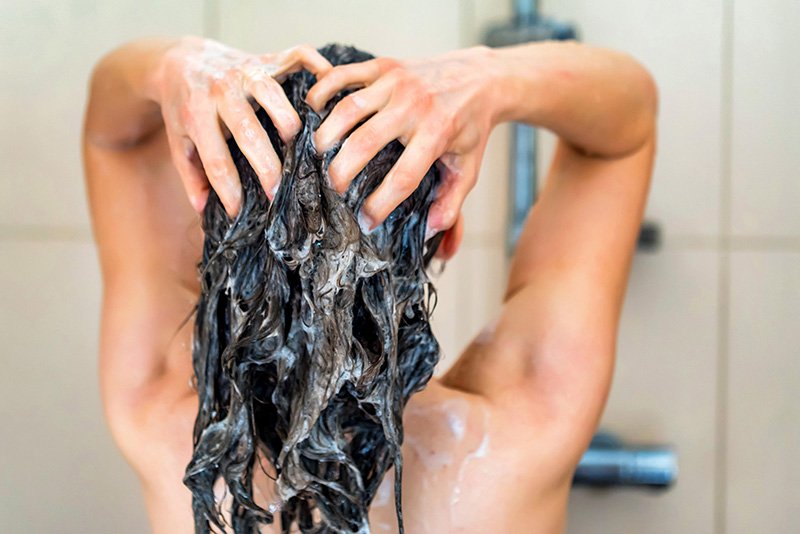By Prudence Wade
Many of us have been using the past year to fine-tune our skincare routines, but there’s a chance you’re missing out a major area: your scalp.
This probably won’t last long. ‘Scalp’ searches increased by 196 per cent on Cult Beauty last year, and our obsession is growing – but where did it come from?
“Being in lockdown has helped highlight what we want to ‘fix’ with our skin and hair, and as the scalp is an extension of our skin, it’s increasingly becoming part of people’s haircare regimens,” explains Michael Shaun Corby, global creative director of Living Proof.
Corby puts it simply: “Healthy hair starts with a healthy scalp, so scalp health is an essential component to having great hair.” The odd hair mask won’t quite cut it – you have to go to the roots, literally.
“The hair follicle is where the nutrients are passed through to the hair, so not having enough nutrients will change your hair texture,” Corby says. “It may lead to thinning or even fall out if there’s a deficiency in key nutrients. Your scalp’s hydration and condition are essential for healthy looking hair.”
The Ayurvedic approach to haircare has long championed scalp health. Inspired by hair oiling and massages from his grandmother growing up, Akash Mehta co-founded haircare brand Fable & Mane with his sister Nikita. Mehta says: “Your hair is the plant, your scalp is the soil. You can’t forget about the soil – you have to nurture and take care of it, because that’s going to lead to healthier hair growth.”
“Like the skin on your face, pores can get clogged with excess sebum or dirt,” Corby says. Our heads need even more care as “the hair follicles are thicker, which means it produces more sebum. Dead skin cells can get trapped between the hairs on the scalp as well as dirt, dust, pollution and so on.”
This means proper hair washing is key. Corby suggests scalp scrubs and exfoliators can be “abrasive”, so recommends using a detoxifying shampoo once a week instead “to remove product build up, hard water on hair and scalp, and pollution”.
Mehta is a big advocate of weekly massages, saying: “When you’re massaging your scalp, you’re increasing the blood circulation and therefore, you’re allowing more oxygen to reach your scalp, which is in turn, going to increase the hair production. That’s what’s going to increase hair growth – a lot of clinical trials are needed, but it’s been tried and tested for centuries in India, with the 4,000-year-old science of Ayurveda, where Indian head massages were practiced daily.”
So, how can you give yourself a ‘crown chakra massage’?
“The first step,” says Mehta “is to get an oil in your hand, activate it, breathe deeply and enjoy the aroma, then find your crown chakra point – usually at the top of your head” – around four fingers back from your hairline. “This is where you want to start your hair oiling and massage. Start massaging outwards… Make sure you’re focusing on the whole head and not just one part, because you want to circulate blood flow around the whole head.”
When choosing a hair oil, Mehta suggests starting in your own kitchen. “From a holistic point of view, coconut oil is the best for scalp health, because it contains vitamins and fatty acids, which are really important to penetrate the hair follicles and nourish the scalp and the roots,” he explains. If you’re looking for a more specifically tailored product, think about your hair type: “If you have thin, frizzy hair, almond oil and sesame oil are really good for nourishing and moisturising your follicles,” says Mehta. “If you have very fine hair that’s prone to thinning, you can use coconut oil and argan oil, or if you have very thick or oily hair, olive oil is very good.”
“Scalp issues can be connected to lots of different things – from your hormones to stress and your diet – so it’s best to consult a dermatologist if you have seen a change in your scalp,” Corby says.
If you want a generally healthier scalp, Corby recommends adding “plenty of protein, vitamin B and zinc in your diet”.
Yes, it’s important to have clean hair – but that doesn’t mean we should be reaching for the shampoo every day. Over-washing is something Corby sees time and time again, saying it can “strip the hydration from your scalp, which can lead to dryness and irritation”.
He also recommends ditching shampoos with sulphates, particularly if your scalp feels dry, itchy or is prone to spots. “Sulphates can often cause irritation, so it’s best to avoid if possible,” he says.







Click here to change your cookie preferences